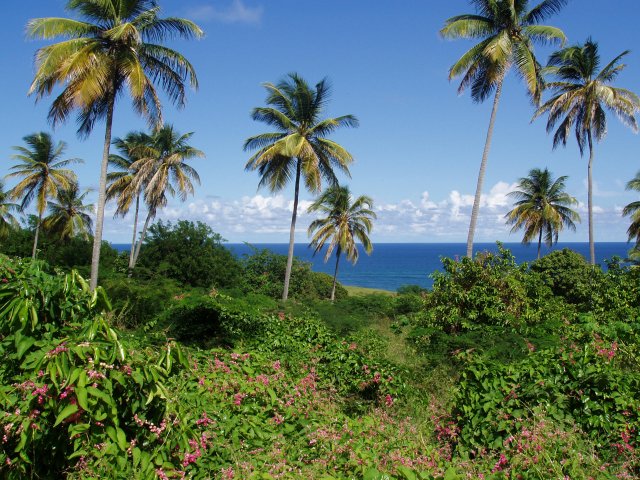













About Nevis
GeographyNevis (pronounced nee'-vis) is part of the St. Kitts & Nevis Federation, an independent nation within the British Commonwealth. The Federation received its independence from Britain in 1983, and British influence is still strong. Nevis was presumably named by Christopher Columbus, who sailed by and landed on St. Kitts in 1493. Nevis comes from the Spanish word for snow; the name was inspired by white clouds around Nevis Peak. Nevis is one of the Leeward Islands and lies about 200 miles south of Puerto Rico. (See a map of the Caribbean Sea here.) Nevis is slightly elongated, 7 miles long and 5 miles wide with an area of 36 sq. miles. See a map of Nevis in Google Maps.) A drive around the island on the main road takes about an hour. The beautiful Nevis Peak, an extinct volcano (elev. 3,232 ft.), dominates the landscape. Nevis is separated from St. Kitts by a narrow strait. Nevis is exceptionally green with some rainforest up in the hills. HistoryLike all Carribbean islands, Nevis has a long history of battles, pirates, and hurricanes. In the late 17th and early 18th centuries, sugar production on Nevis surpassed most other Caribbean islands, making it a valuable possession and gaining it the name of "The Queen of the Caribees." For an entertaining (if not 100% accurate) account of Nevis history, get a copy of Swords, Ships, and Sugar: A History of Nevis to 1900 by Vincent K. Hubbard. PeopleAbout 10,000 people live on Nevis, most of African descent. The official language is English. Nevis is relatively prosperous, with a literacy rate exceeding 97% and an average life expectancy of over 67 years. The capital of Nevis is Charlestown. Nevisians are church-going people with Methodist, Baptist, Roman Catholic, Jehovah s Witnesses and other faiths represented, as well as Rastafarian. There is no synagogue but there used to be one in the 17th - 18th centuries; a Jewish cemetery with some 300-year-old graves is located near the center of Charlestown. EconomyThere is no agriculture left on Nevis beyond small farming; sugar production stopped long ago. The main source of income is tourism. The luxury Four Seasons resort is the major employer. Nevis is quieter and more upscale than St. Kitts; there are no cruise ships, casinos, or high-rise hotels on Nevis. And Nevisians like it that way. |
WeatherThe year-round temperature ranges from 25oC to 30oC (77oF - 86oF), usually with a cool breeze on the Calypso and Iris verandas. In October and early November Nevis may get some clouds and rain. The rest of the year, occasional tropical showers lasting only a couple of minutes bring spectacular rainbows over the sea. MoneyThe official currency is the Eastern Caribbean Dollar (EC), which is tied to the US dollar at the rate of US$ 1 = EC$ 2.688. US dollars are accepted everywhere, though change may often be given in EC. Credit cards are accepted widely, including some grocery stores. There are a number of ATMs in town and at the airport. Phone and the InternetDirect dial to and from the US, area code 869. Most people and businesses use WhatsApp. Wi-Fi is available at the villas. Driving and Getting AroundIt is probably better to just take a cab on the day of your arrival. For a car rental, try reserving Paradise Sun Rentals, Deynason, 869-667-6203. He also operates a water taxi to/from St. Kitts and offers boat charters. Also Nevis Car Rentals, 869-469-9837; Striker's Car Rentals, 869-469-2654; TDC, 869-469-5690 and other car rental companies will bring a car or a jeep to your villa or will pick you up. Driving is on the left side. An SUV works better on Nevis roads ($50-$55 US/day). Also Herts has recently opened a rental desk at the Oualie Resort below, in the reception area. Taxis are readily available but not cheap ($15-$20 US for a five-minute ride from the Nevis airport to Calypso and Iris). "Dollar Buses" (actually minivans) go to Charlestown (EC$5) and elsewhere around the island every half hour or so. More InformationSee news and information at the lovely and detailed web site of the Nevis Tourism Authority, www.nevisisland.com. |
